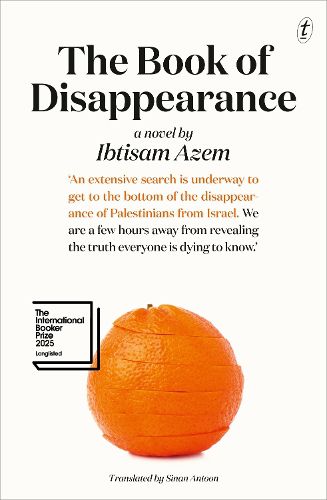The book of disappearance by Ibtisam Azem. Trans. by Sinan Antoon

Originally written in Arabic in 2014 and translated into English in 2019, this latest edition of The book of disappearance is now available to Australian and UK readers, and was longlisted for the International Booker Prize 2025. Most disturbing for readers of this novel is the realisation that the central premise of a book written over ten years ago, can today be an infamously touted slogan in the current political environment with the call by a world leader to solve all problems in the contested Middle Eastern lands by simply clearing the Palestinians out of the region. Ten years ago, author Ibtisam Azem actually explored this idea and imagined what would happen if the Arabs all just disappeared from Israel overnight.
The varied reactions are her focus; from those who suspect a devious Arab plot to strike while the Israelis are complacent, to those who think the government has secretly achieved its objective, to those who thank divine intervention. The situation is confounding: there are no refugee workers for the flower farm, buses wait for bus drivers who don’t turn up, a surgery is cancelled, a prison guard robbed of his torture victim suffers an anxiety attack. Everyone is aghast, and anxiously awaits the government’s explanation.
At the start of the novel there is a personal experience of disappearance, as Alaa joins his mother in searching for his grandmother, who has gone missing from their house. They are a Palestinian family; Alaa’s grandmother was the keeper of memories of their home, the city of Jaffa now renamed and subsumed within the greater Tel Aviv. His grandmother remembers the old city, the original places and streets, the ghosts of the past before the Nakba of 1948, the ethnic cleansing of their land and property, and suppression of their rights. Obstinately she would eat the famous Jaffa oranges, though she didn’t actually like the fruit, in memory of the past and in symbolic defiance of the current Israeli regime. Alaa holds on to those precious memories in a red covered journal.
It is Alaa’s journal that provides the framework of the novel, as Ariel, Alaa’s ‘liberal’ Jewish journalist friend reads chapters between crafting articles on the Palestinian disappearance for the newspapers. Yet even the friend, the moderate Ariel, once served in a troop that fired on a child throwing rocks, and despite his professed liberal views, he has no compunction about moving into his missing friend’s apartment, eating his food and sleeping in his bed.
There are reminders of the history, of the Palestinians displaced from their land, their homes taken, people turned out, children killed and women raped. Even after their disappearance, the regime that has been set up to control the Palestinians continues, with policing of the districts, searches of people entering buildings, and demands that everyone produce documentation of their identity. The so-called democratic nation of the Middle East is as authoritarian as ever.
This is a powerful novel, enduring in the issues it exposes, with the recurring themes of oppression and ‘disappearance’ of people. It is a novel that will stay in your mind, and provides a compelling case for dialogue about a story that is ongoing. For another outstanding literary work on this subject, read Hasib Hourani’s award-winning poem Rock flight.
Themes: Palestine, Displacement, Disappearance, Persecution.
Helen Eddy